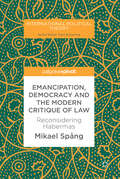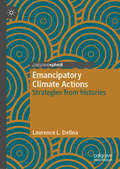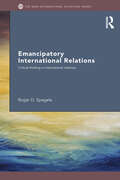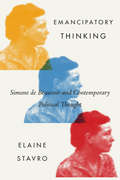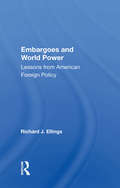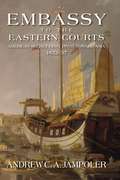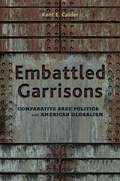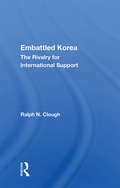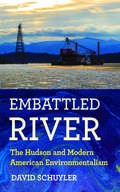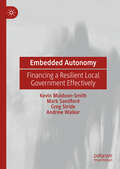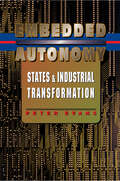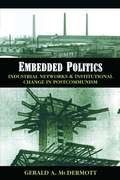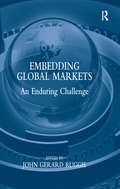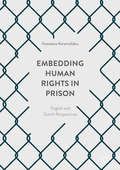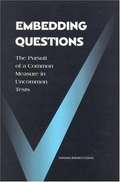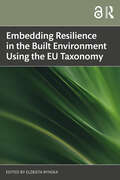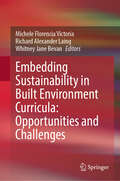- Table View
- List View
Emancipation, Democracy and the Modern Critique of Law: Reconsidering Habermas (International Political Theory)
by Mikael SpångThis book focuses on Jürgen Habermas’ theorising on law, rights and democracy in light of the modern critique of law. The latter tradition, which goes back to Hegel and Marx, has addressed the limitations of rights as vocabulary of emancipation and law as language of autonomy. Since Habermas claims that his reconstruction of private and public autonomy has an emancipatory aim, the author has chosen to discuss it in the context of the modern critique of law. More specifically, the study addresses the need to consider the dialectic of law, in which law is both a condition for emancipation and domination, when discussing what law and rights permit. It will appeal to students and scholars across the fields of political theory, law and legal criticism, as well as sociology and sociology of law.
Emancipatory Climate Actions: Strategies from histories
by Laurence L. DelinaThis book calls for a collective strengthening of the progressive dimension of climate action in the face of continued myopic governmental response. Delina argues that consent must be revoked and power realigned to avoid suffering the consequences of unabated climate change. He looks back at the mechanisms that make previous social mobilizations successful to design strategies that would advance a new hegemonic agenda. This new agenda calls for the culturing of contemporary human societies towards a hegemony characterized by just emancipations and sustainable transformations. Mining select histories from India, the United States, the Philippines, and Burma, the book explores topics including visioning and identity building; framing; triggering pressure; boosting publicity; and diversifying networks as strategic tools to the repertoires of climate action groups, organizations, and institutions. It will be of great value to academics and practitioners, as well as to anyone interested in how to actively combat climate change.
Emancipatory Feminism in the Time of Covid-19: Transformative resistance and social reproduction (Democratic Marxisms)
by Vishwas Satgar Christine Bischoff Jacklyn Cock Ruth Ntlokotse Hawzhin Azeez Asanda Benya Jane Cherry Samantha Hargreaves Inge Konik Jane Mbithi-Dikgol Courtney Morgan Sonia Phalatse Busi Sibeko Dineo SkosanaThe Covid-19 pandemic showed that a patriarchal capitalist socio-economic system is unable to address the socio-ecological reproduction need of societies. This volume foregrounds the possibilities emancipatory feminism creates by resisting neo-liberalism through grassroots and indigenous activism.The Covid-19 pandemic threw into stark relief the multi-dimensional threats created by neoliberal capitalism. Government measures to alleviate the crisis were largely inadequate, leaving women – in particular working-class women – to carry the increased burden of care work while at the same time placing themselves in direct risk as frontline workers.Emancipatory Feminism in the Time of Covid-19, the seventh volume in the Democratic Marxism series, explores how many subaltern women – working class, peasant and indigenous –challenge hegemonic neoliberal feminism through their resistance to ordinary capitalist practices and ecological extractivism. Contributors cover women’s responses in a wide range of contexts: from women leading the defence of Rojava – the Kurdish region of Syria, to approaches to anti-capitalist ecology and building food secure pathways in communities across Africa, to championing climate justice in mining affected communities and transforming gender divisions in mining labour practices in South Africa, to contesting macro-economic policies affecting the working conditions of nurses. Their practices demonstrate a feminist understanding of the current systemic crises of capitalism and patriarchal oppression. What is offered in this collection is a subaltern women’s grassroots resistance focused on advancing and enabling solidarity-based political projects, deepening democracy, building capacities and alliances to advance new feminist alternatives.
Emancipatory International Relations: Critical Thinking in International Relations (New International Relations)
by Roger D. SpegeleInternational relations theory is witnessing a veritable explosion of works within the areas of modernism and postmodernism, yet there has been no attempt to compare these theories and their sources according to a common criterion or logical form. This author argues that while these pioneering, imaginative and exciting theoretical works are disparate, they also share a common thread that seeks to express emancipatory goals for international relations. This book provides an in-depth critical study of this genre of theorizing that he names ‘Emancipatory International Relations’. Spegele develops a framework to help the reader understand both the differences and commonalities in modernist and postmodernist emancipatory thinking in International Relations. He critically analyzes modernist theories, discourses, narratives and postmodernist theory and practice, feminist emancipatory discourses and postmodernist international discourse and concludes by examining the coherence, viability and plausibility of emancipatory discourses in international relations whether modernist or postmodernist. This challenging and innovative volume will be of interest to students and researchers of international relations.
Emancipatory Thinking: Simone de Beauvoir and Contemporary Political Thought (McGill-Queen's Studies in the History of Ideas #76)
by Elaine StavroMost scholars have focused on The Second Sex and Simone de Beauvoir’s fiction, concentrating on gender issues but ignoring her broader emancipatory vision. Though Beauvoir’s political thinking is not as closely studied as her feminist works, it underpinned her activism and helped her navigate the dilemmas raised by revolutionary thought in the postwar period. In Emancipatory Thinking Elaine Stavro brings together Beauvoir’s philosophy and her political interventions to produce complex ideas on emancipation. Drawing from a range of work, including novels, essays, autobiographical writings, and philosophic texts, Stavro explains that for Beauvoir freedom is a movement that requires both personal and collective transformation. Freedom is not guaranteed by world historical systems, material structures, wilful action, or discursive practices, but requires engaged subjects who are able to take creative risks as well as synchronize with existing forces to work towards collective change. Beauvoir, Stavro asserts, resisted the trend of anti-humanism that has dominated French thinking since the 1960s and also managed to avoid the pitfalls of voluntarism and individualism. In fact, Stavro argues, Beauvoir appreciated the impact of material, socio-economic, institutional forces, without forgoing the capacity to initiate. Applying Beauvoir’s existential insights and understanding of embodied and situated subjectivity to recent debates within gender, literary, sociological, cultural, and political studies, Emancipatory Thinking provides a lens to explore the current political and theoretical landscape.
Emanuel Celler: Immigration and Civil Rights Champion
by Wayne DawkinsCongressman Emanuel Celler (1888–1981) was a New York City congressman who served in the United States House of Representatives from 1923 to 1973. Celler’s almost fifty-year career was highlighted by his long fight to eliminate national origin quotas as a basis for immigration restrictions and his battles for civil rights legislation. In Emanuel Celler: Immigration and Civil Rights Champion, author Wayne Dawkins introduces new readers to a figure integral to our contemporary political system. Celler’s own immigrant background framed his lifelong opposition to immigration restrictions and his corresponding support for reducing barriers for immigrant entry into the United States. After decades of struggle, he proposed and steered through the House the Hart-Celler Act of 1965, which eliminated national origins as a consideration for immigration, profoundly shaping modern America. Celler was also a consistent advocate for civil rights. As chairman of the House Judiciary Committee from 1949 to 1973 (except for a break from 1953 to 1955), Celler was involved in drafting and passing the Civil Rights Act of 1964, the Voting Rights Act of 1965, and the Civil Rights Act of 1968. During his career he was also deeply involved in landmark antitrust legislation, the establishment of US ties with the state of Israel, and the Gun Control Act of 1968, and was the author of three constitutional amendments, including the 25th that established presidential succession. Dawkins profiles a complex politician who shaped the central tenets of Democratic Party liberalism for much of the twentieth century and whose work remains central to the nation, and our political debates, today.From author Wayne Dawkins:Emanuel Celler (1888–1981) could be the most significant US legislator of the twentieth century. He cosponsored three Constitutional amendments—the twenty-third (voting rights for District of Columbia residents), the twenty-fourth (poll taxes banned), and the twenty-fifth (clear succession established if the president is removed from office). And, as a longtime chairman of the House Judiciary Committee, he reluctantly cosponsored a fourth—the twenty-sixth amendment (18-year-old voting rights).He is also linked to three-hundred laws, notably the Civil Rights Acts of 1957, 1960, 1964 and 1968; the Voting Rights Act of 1965; and his masterpiece, the Hart-Celler Immigration Reform Act of 1965.Over the past decade, Celler, who served fifty years in Congress, has been a supporting cast member in at least a dozen books about immigration or civil rights. He was frequently cited in One Mighty and Irresistible Tide (2020) and noted in two key moments of The Guarded Gate (2019). And he was cited generously in Goliath (2019), a book about Celler’s other passion—antitrust and monopoly busting.But this fall, he will at last be the focus of a full-length biography, Emanuel Celler: Immigration and Civil Rights Champion. And I believe it will become the go-to book for anyone wanting to know more about this history-making legislator.
Embargoes And World Power: Lessons From American Foreign Policy
by Richard J EllingsThis book analyzes the use of strategic embargoes and economic sanctions in the postwar period, tracing their changing applications in the context of developments in the global distribution of power. Dr. Ellings uses two approaches: a case study of the ongoing strategic Western embargo against selected communist countries and a comparative study of
Embassy To The Eastern Courts: America's Secret First Pivot Toward Asia, 1832-37
by Andrew C. JampolerIn the aftermath of the Napoleonic Wars, the U. S. found its merchants and traders locked out of their traditional markets in Europe and the Caribbean. Hoping for new and profitable American trade relationships, President Andrew Jackson dispatched an unemployed ship-owner and merchant with no diplomatic experience on a secret mission to negotiate with Eastern potentates in their courts. Edmund Roberts’ mission was to formalize American trade with these exotic places--Oman, Siam, Cochin China, and Japan--on a most favored nation basis, allowing for American consuls to openly advance and protect American interests and citizens in their host country. After sailing almost 70,000 miles in five years in the ill-fated USS Peacock, Roberts was successful in negotiating treaties with Oman and Siam, but he failed in Cochin China, and he died before setting sail to Japan. Peacock, first flagship of the Navy’s new East Indies Squadron, forerunner of the U. S. Seventh Fleet, outlived him by only a few years.
Embattled Europe: A Progressive Alternative
by Konrad H. JarauschA bracing corrective to predictions of the European Union’s decline, by a leading historian of modern EuropeIs the European Union in decline? Recent history, from the debt and migration crises to Brexit, has led many observers to argue that the EU’s best days are behind it. Over the past decade, right-wing populists have come to power in Poland, Hungary, and beyond—many of them winning elections using strident anti-EU rhetoric. At the same time, Russia poses a continuing military threat, and the rise of Asia has challenged the EU's economic power. But in Embattled Europe, renowned European historian Konrad Jarausch counters the prevailing pessimistic narrative of European obsolescence with a rousing yet realistic defense of the continent—one grounded in a fresh account of its post–1989 history and an intimate understanding of its twentieth-century horrors.An engaging narrative and probing analysis, Embattled Europe tells the story of how the EU emerged as a model of democratic governance and balanced economic growth, adapting to changing times while retaining its value system. The book describes the EU’s admirable approach to the environment, social welfare, immigration, and global competitiveness. And it presents underappreciated European success stories—including Denmark’s transition to a green economy, Sweden’s restructuring of its welfare state, and Poland’s economic miracle.Embattled Europe makes a powerful case that Europe—with its peaceful foreign policy, social welfare solidarity, and environmental protection—offers the best progressive alternative to the military adventurism and rampant inequality of plutocratic capitalism and right-wing authoritarianism.
Embattled Garrisons: Comparative Base Politics and American Globalism
by Kent E. CalderThe overseas basing of troops has been a central pillar of American military strategy since World War II--and a controversial one. Are these bases truly essential to protecting the United States at home and securing its interests abroad--for example in the Middle East-or do they needlessly provoke anti-Americanism and entangle us in the domestic woes of host countries? Embattled Garrisons takes up this question and examines the strategic, political, and social forces that will determine the future of American overseas basing in key regions around the world. Kent Calder traces the history of overseas bases from their beginnings in World War II through the cold war to the present day, comparing the different challenges the United States, Britain, France, and the Soviet Union have confronted. Providing the broad historical and comparative context needed to understand what is at stake in overseas basing, Calder gives detailed case studies of American bases in Japan, Italy, Turkey, the Philippines, Spain, South Korea, the Balkans, Afghanistan, and Iraq. He highlights the vulnerability of American bases to political shifts in their host nations--in emerging democracies especially--but finds that an American presence can generally be tolerated when identified with political liberation rather than imperial succession. Embattled Garrisons shows how the origins of basing relationships crucially shape long-term prospects for success, and it offers a means to assess America's prospects for a sustained global presence in the future.
Embattled Korea: The Rivalry For International Support
by Ralph N. CloughThis comprehensive book examines the history of Korea's division and the political and economic development of both Koreas, their military confrontation, and their efforts at dialogue. Mr. Clough focuses on the international rivalry between the two, including relations with big power supporters and diplomatic competition inside and outside the UN and the nonaligned movement. The first book to explore in detail the competition between Seoul and Pyongyang outside the diplomatic circuit—from overseas construction projects to international athletic contests—Mr. Clough's study breaks new ground, analyzing South Korea's growing contacts with the USSR and the PRC, as well as North Korea's relationship with Japan and the United States. He views these contacts as probable precursors of diplomatic recognition of both Koreas by all four big powers. Identifying the problems and the choices for the United States in the rapidly changing environment in and around Korea, Mr. Clough makes recommendations for the future direction of U.S. policy.
Embattled Nation: Canada's Wartime Election of 1917
by David Mackenzie Patrice DutilEmbattled Nation explores Canada’s tense wartime election of 1917. Amidst the drama of the First World War, Canada’s most divisive election ever raised pivotal questions about Canada’s place in the war and the world. This book examines the issues, people, and events behind one of the most important elections in Canada’s history.
Embattled River: The Hudson and Modern American Environmentalism
by David SchuylerIn Embattled River, David Schuyler describes the efforts to reverse the pollution and bleak future of the Hudson River that became evident in the 1950s. Through his investigative narrative, Schuyler uncovers the critical role of this iconic American waterway in the emergence of modern environmentalism in the United States.Writing fifty-five years after Consolidated Edison announced plans to construct a pumped storage power plant at Storm King Mountain, Schuyler recounts how a loose coalition of activists took on corporate capitalism and defended the river. As Schuyler shows, the environmental victories on the Hudson had broad impact. In the state at the heart of the story, the immediate result was the creation in 1970 of the New York State Department of Environmental Conservation to monitor, investigate, and litigate cases of pollution. At the national level, the environmental ferment in the Hudson Valley that Schuyler so richly describes contributed directly to the creation of the Environmental Protection Agency in 1970, the passage of the Clean Water Act in 1972, and the creation of the Superfund in 1980 to fund the cleanup of toxic-dumping sites.With these legal and regulatory means, the contest between environmental advocates and corporate power has continued well into the twenty-first century. Indeed, as Embattled River shows, the past is prologue. The struggle to control the uses and maintain the ecological health of the Hudson River persists and the stories of the pioneering advocates told by Schuyler provide lessons, reminders, and inspiration for today's activists.
Embattled: How Ancient Greek Myths Empower Us to Resist Tyranny
by Emily Katz AnhaltAn incisive exploration of the way Greek myths empower us to defeat tyranny. As tyrannical passions increasingly plague twenty-first-century politics, tales told in ancient Greek epics and tragedies provide a vital antidote. Democracy as a concept did not exist until the Greeks coined the term and tried the experiment, but the idea can be traced to stories that the ancient Greeks told and retold. From the eighth through the fifth centuries BCE, Homeric epics and Athenian tragedies exposed the tyrannical potential of individuals and groups large and small. These stories identified abuses of power as self-defeating. They initiated and fostered a movement away from despotism and toward broader forms of political participation. Following her highly praised book Enraged: Why Violent Times Need Ancient Greek Myths, the classicist Emily Katz Anhalt retells tales from key ancient Greek texts and proceeds to interpret the important message they hold for us today. As she reveals, Homer's Iliad and Odyssey, Aeschylus's Oresteia, and Sophocles's Antigone encourage us—as they encouraged the ancient Greeks—to take responsibility for our own choices and their consequences. These stories emphasize the responsibilities that come with power (any power, whether derived from birth, wealth, personal talents, or numerical advantage), reminding us that the powerful and the powerless alike have obligations to each other. They assist us in restraining destructive passions and balancing tribal allegiances with civic responsibilities. They empower us to resist the tyrannical impulses not only of others but also in ourselves. In an era of political polarization, Embattled demonstrates that if we seek to eradicate tyranny in all its toxic forms, ancient Greek epics and tragedies can point the way.
Embedded Autonomy: Financing a Resilient Local Government Effectively
by Andrew Walker Kevin Muldoon-Smith Mark Sandford Greg StrideThis book addresses the sustained failure to properly fund local government in England. While there has been plenty of rhetoric and policy initiatives around devolution of power to local authorities in recent decades, continuing recently with the English Devolution Bill, there has been far less attention paid to how these endeavours will be practically delivered and, most importantly, funded. In this context, the motivation in this book is to consider how local government in England could be funded differently. How can the continual hand to mouth existence of local authorities, and those that work to support them, be improved? Drawing on a system-based analysis of international local government practice, the authors develop a new theory of embedded autonomy to help understand and frame how local government can be funded effectively in England.
Embedded Autonomy: States and Industrial Transformation
by Peter B. EvansIn recent years, debate on the state's economic role has too often devolved into diatribes against intervention. Peter Evans questions such simplistic views, offering a new vision of why state involvement works in some cases and produces disasters in others. To illustrate, he looks at how state agencies, local entrepreneurs, and transnational corporations shaped the emergence of computer industries in Brazil, India, and Korea during the seventies and eighties. Evans starts with the idea that states vary in the way they are organized and tied to society. In some nations, like Zaire, the state is predatory, ruthlessly extracting and providing nothing of value in return. In others, like Korea, it is developmental, promoting industrial transformation. In still others, like Brazil and India, it is in between, sometimes helping, sometimes hindering. Evans's years of comparative research on the successes and failures of state involvement in the process of industrialization have here been crafted into a persuasive and entertaining work, which demonstrates that successful state action requires an understanding of its own limits, a realistic relationship to the global economy, and the combination of coherent internal organization and close links to society that Evans called "embedded autonomy."
Embedded Politics: Industrial Networks and Institutional Change in Postcommunism
by Gerald A. McdermottEmbedded Politics offers a unique framework for analyzing the impact of past industrial networks on the way postcommunist societies build new institutions to govern the restructuring of their economies. Drawing on a detailed analysis of communist Czechoslovakia and contemporary Czech industries and banks, Gerald A. McDermott argues that restructuring is best advanced through the creation of deliberative or participatory forms of governance that encourages public and private actors to share information and take risks. Further, he contends that institutional and organizational changes are intertwined and that experimental processes are shaped by how governments delegate power to local public and private actors and monitor them. Using comparative case analysis of several manufacturing sectors, Embedded Politics accounts for change and continuity in the formation of new economic governance institutions in the Czech Republic. It analytically links the macropolitics of state policy with the micropolitics of industrial restructuring. Thus the book advances an alternative approach for the comparative study of institutional change and industrial adjustment. As a historical and contemporary analysis of Czech firms and public institutions, this book will command the attention of students of postcommunist reforms, privatization, and political-economic transitions in general. But also given its interdisciplinary approach and detailed empirical analysis of policy-making and firm behavior, Embedded Politics is a must read for scholars of politics, economics, sociology, political economy, business organization, and public policy.
Embedding Global Markets: An Enduring Challenge
by John Gerard RuggieJohn Ruggie introduced the concept of embedded liberalism in a 1982 article that has become one of the most frequently cited sources in the study of international political economy. The concept was intended to convey the manner by which capitalist countries learned to combine the efficiency of markets with the broader values of the community that socially sustainable markets themselves require in order to survive and thrive. Examining the concept and the institutionalized practice of embedded liberalism, this collection provides a survey of the macro patterns in industrialized countries. Leading scholars combine to demonstrate the benefits of embedded liberalism in practice as well as its gradual erosion at national levels, and to analyze public opinion. They provide a better understanding of what embedded liberalism means, why it matters and how to reconstitute it in the context of the global economy. The contributors contextualize the current challenge historically and theoretically so that students, scholars and policy makers alike are reminded of what is at stake and what is required.
Embedding Human Rights in Prison
by Anastasia KaramalidouThis is a comparative study of prisoners' human rights in England, Wales and the Netherlands. Over the years changes in Dutch penal policy have smoothed to some degree the sharp contrasting differences that were once characteristic of the English and the Dutch prison systems. In this context, the study documents the impact of the two countries' penal policies on prisoners' human rights and presents prisoners' views on the human rights contribution to prison life and prisoner treatment. English and Dutch prisoners treat human rights recognition and protection as the yardstick of the prison's legitimacy in contemporary democracies. Drawing on their respective experiences, Karamalidou highlights valuable lessons on what practices to adopt and what practices to cease with a view to embedding human rights in prison. A compassionate and thought-provoking study, this book will be of interest to undergraduate and postagraduate students of penology and human rights.
Embedding Questions: The Pursuit of a Common Measure in Uncommon Tests
by National Research CouncilInformation on The Pursuit of a Common Measure in Uncommon Tests
Embedding Resilience in the Built Environment Using the EU Taxonomy
by Elzbieta RynskaTaxonomy is the common name for an EU regulation that supports companies in sustainable environmental and climate action (Regulation [EU] No. 2020/852). It is a classification tool designed for investors, companies, and financial institutions to define the environmental impact of business activities and the requirements that organisations must meet to be considered as sustainable.The aim of this book is to examine the EU taxonomy from the built environment perspective and the ways in which it can be used to build resilience in real estate. It presents the issues, hot points, and possible choices from the designers, construction consultants, and investing bodies' points of view, those who must set forth initial conditions, which should later become the keystones for greener developments. It brings together the expertise of a unique team of both researchers and professionals and presents a methodology, case studies, and solutions which together comprise a novel understanding of the taxonomy’s influence on the pre-construction phase. The book:• describes the role of the built environment within sustainable development and how real estate can be used to build resilience with the use of taxonomy.• describes the characteristics of resilient environmentally friendly cities in the future.• proposes a roadmap to demonstrate urban policies that promote decarbonisation; and•enables investors to compare their products, operations, and strategies in terms of sustainability.Overall, this book is essential reading for decision-makers in the public and private sectors, urban developers, space and spatial designers, architects, planners, community stakeholders, and real estate investors.Chapter 1 of this book is freely available as a downloadable Open Access PDF at http://www.taylorfrancis.com under a Creative Commons Attribution-Non Commercial-No Derivatives (CC-BY-NC-ND) 4.0 license.
Embedding Sustainability in Built Environment Curricula: Opportunities and Challenges
by Michele Florencia Victoria Richard Alexander Laing Whitney Jane BevanThis book offers a comprehensive collection of best practices, gathered from classrooms across the globe, aimed at actively engaging students in sustainability. These tried and tested methods, presented within its pages, provide educators with valuable tools that can be easily adopted or tailored to their own academic environments. Moreover, this book serves as resource for policymakers, shedding light on the fundamental drivers and formidable challenges associated with integrating sustainability principles within higher education institutions. As an added bonus, researchers will find an overview of the cutting-edge literature currently available, as well as valuable suggestions for future research.
Ember Quartet Digital Collection (An Ember in the Ashes)
by Sabaa TahirJourney deep into the Martial Empire and into &“one of the best fantasy series of the last decade&” (Buzzfeed) with the complete An Ember in the Ashes quartet by #1 New York Times bestselling author Sabaa Tahir. For the first time together, all in one place, this ebook bind-up includes each complete book of the beloved epic series: An Ember in the Ashes, One of Time Magazine&’s 100 Best Fantasy Books of All TimeA Torch Against the Night, A New York Times bestseller, A USA Today bestseller, A Wall Street Journal bestsellerA Reaper at the Gates, An Entertainment Weekly Summer Reads pickA Sky Beyond the Storm, One of Amazon&’s Best Young Adult Books of 2020 Praise for An Ember in the Ashes: &“Sabaa Tahir spins a captivating, heart-pounding fantasy.&” —Us Weekly &“This novel is a harrowing, haunting reminder of what it means to be human—and how hope might be kindled in the midst of oppression and fear.&” —The Washington Post &“An Ember in the Ashes mixes The Hunger Games with Game of Thrones...and adds a dash of Romeo and Juliet.&” —The Hollywood Reporter Praise for A Torch Against the Night: &“The stakes here are high and the plot runs like a well-oiled machine, ratcheting up the tension with every chapter.&” —NPR.org &“An adrenaline rush till the very last page.&” —Buzzfeed "This sequel has a darker tone and even higher stakes than its predecessor, setting the stage for a thrilling conclusion." —Publishers Weekly, starred review Praise for A Reaper at the Gates: &“The book deftly handles serious issues like the costs of genocide and war. Both action-packed and emotionally engaging, A Reaper at the Gates is the perfect summer read.&” —The Washington Post "Tahir has created another compelling story that defies readers to stop turning the pages." —Booklist, starred review Praise for A Sky Beyond the Storm: &“Tahir&’s exquisite storytelling doesn&’t miss a beat… This series is an epic hero&’s journey, with love, adventure, and magic woven throughout. Recommended for every young adult collection.&” —School Library Journal &“In A Sky Beyond the Storm, Sabaa Tahir so expertly draws the reader into the lives and thoughts of her characters that their every emotion—anger, pain, love, longing—races through your heart with each turn of the page. A breathtaking conclusion to this incredibly rich and rewarding fantasy series.&” —Seira Wilson, Amazon Book Review
Embers of War: The Fall of an Empire and the Making of America's Vietnam
by Fredrik LogevallThe struggle for Vietnam occupies a central place in the history of the twentieth century. Fought over a period of three decades, the conflict drew in all the world's powers and saw two of them--first France, then the United States--attempt to subdue the revolutionary Vietnamese forces. For France, the defeat marked the effective end of her colonial empire, while for America the war left a gaping wound in the body politic that remains open to this day. How did it happen? Tapping into newly accessible diplomatic archives in several nations and making full use of the published literature, distinguished scholar Fredrik Logevall traces the path that led two Western nations to lose their way in Vietnam. Embers of War opens in 1919 at the Versailles Peace Conference, where a young Ho Chi Minh tries to deliver a petition for Vietnamese independence to President Woodrow Wilson. It concludes in 1959, with a Viet Cong ambush on an outpost outside Saigon and the deaths of two American officers whose names would be the first to be carved into the black granite of the Vietnam Veterans Memorial. In between come years of political, military, and diplomatic maneuvering and miscalculation, as leaders on all sides embark on a series of stumbles that makes an eminently avoidable struggle a bloody and interminable reality. Logevall takes us inside the councils of war--and gives us a seat at the conference tables where peace talks founder. He brings to life the bloodiest battles of France's final years in Indochina--and shows how from an early point, a succession of American leaders made disastrous policy choices that put America on its own collision course with history: Harry Truman's fateful decision to reverse Franklin Delano Roosevelt's policy and acknowledge France's right to return to Indochina after World War II; Dwight Eisenhower's strenuous efforts to keep Paris in the fight and his escalation of U.S. involvement in the aftermath of the humiliating French defeat at Dien Bien Phu; and the curious turnaround in Senator John F. Kennedy's thinking that would lead him as president to expand that commitment, despite his publicly stated misgivings about Western intervention in Southeast Asia. An epic story of wasted opportunities and tragic miscalculations, featuring an extraordinary cast of larger-than-life characters, Embers of War delves deep into the historical record to provide hard answers to the unanswered questions surrounding the demise of one Western power in Vietnam and the arrival of another. This book will become the definitive chronicle of the struggle's origins for years to come.Advance praise for Embers of War "Fredrik Logevall has gleaned from American, French, and Vietnamese sources a splendid account of France's nine-year war in Indochina and the story of how the American statesmen of the period allowed this country to be drawn into the quagmire."--Neil Sheehan, author of A Bright Shining Lie, winner of the Pulitzer Prize and the National Book Award "Fredrik Logevall is a wonderful writer and historian. In his new book on the origins of the American war in Vietnam, he gives a fascinating and dramatic account of the French war and its aftermath, from the perspectives of the French, the Vietnamese, and the Americans. Using previously untapped sources and a deep knowledge of diplomatic history, Logevall shows to devastating effect how America found itself on the road to Vietnam."--Frances FitzGerald, author of Fire in the Lake, winner of the Pulitzer Prize and the National Book Award
Embezzlement and High Treason Louis XIV's France: The Trial of Nicolas Fouquet
by Vincent J. PittsA look at life in the court of King Louis XIV, the politics of the time, and the trial of a man who knew too much for his own good.From 1661 to 1664, France was mesmerized by the arrest and trial of Nicolas Fouquet, the country’s superintendent of finance. Prosecuted on trumped-up charges of embezzlement, mismanagement of funds, and high treason, Fouquet managed to exonerate himself from all the major charges over the course of three long years, in the process embarrassing and infuriating Louis XIV. The young king overturned the court’s decision and sentenced Fouquet to lifelong imprisonment in a remote fortress in the Alps.A dramatic critique of absolute monarchy in pre-revolutionary France, Embezzlement and High Treason in Louis XIV’s France tells the gripping tale of an overly ambitious man who rose rapidly in the state hierarchy—then overreached. Vincent J. Pitts uses the trial as a lens through which to explore the inner workings of the court of Louis XIV, who rightly feared that Fouquet would expose the tawdry financial dealings of the king’s late mentor and prime minister, Cardinal Mazarin.“A compelling account of a political drama in mid-seventeenth century France, but it is also a window into the process by which rule of law gradually became established . . . [and] I thoroughly enjoyed reading it.” —EH.Net“Pitts’s book examines the show trial of Fouquet, and…the political process that created such an unfair outcome for a man who is often seen as one of the most well-known scapegoats in French history. Pitts has succeeded masterfully in weaving a powerful narrative that exposes convoluted corruption and mismanagement of ancient régime France.” —Renaissance Quarterly
